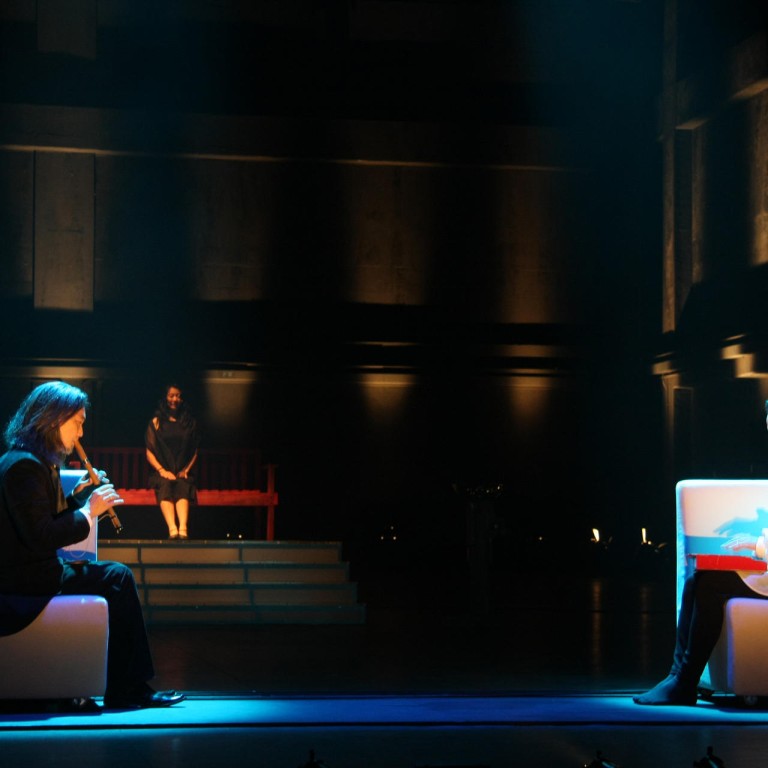
Arts preview: The Box's new show reflects the spirit of the student demonstrators
When musical theatre ensemble The Box, comprising of Kung Chi-sing and Peter Suart, started planning their latest show two years ago, they could not have predicted the current events in Hong Kong.
THE BOX, SIDE 15 — THE WORLD WAS MADE ON A SUNDAY
The Box
When musical theatre ensemble The Box, comprising of Kung Chi-sing and Peter Suart, started planning their latest show two years ago, they could not have predicted the current events in Hong Kong. The multimedia show was inspired by the way Russian writer Vladimir Nabokov and composer Dmitri Shostakovich managed to create great art in troubled times, and is well-timed amid the Umbrella Revolution.
"We've used photos of our teenage selves in the flyer, and that was before everybody was asked to post their childhood photo on Facebook to support the students," says Kung, in his Sheung Wan studio. "I'm not saying I see things ahead of time, but history does seem to repeat itself. There is always a stupid, repressive and arrogant government, and a youthful idealism. When I go to Admiralty, I see the same thing."
This project, which arrives seven years after their last performance (2007), stays true to The Box's tradition, and draws on works of literature.
is a line from Nabokov's autobiographical memoir , which Kung loves for its playfulness. The duo draw a parallel between Nabokov and Shostakovich, who instead of emigrating like Nabokov's family, remained in Russia under Stalin's rule.
"These two Russian artists are very interesting: one lived in a free world, while the other lived under a repressive system. But both became great artists, and found their freedom spiritually," says Kung. "And then there's Stalin. For me, there have always been Stalinist forces in history: for instance, Emperor Qin, Mao or Hitler. Although C.Y. Leung is a small potato, he represents a repressive government, the enemy of the people.
"We'll always be faced with dark forces and destructive energy. But somehow, we manage to survive because there are counter forces like religion and philosophy. For me, art is a major one," he adds.

As the father, Kung wonders if there is a future for our children. That is why Kung has invited his 16-year-old daughter, Chiara Kung, to take part in the show. "The world is for her in the future, if it still exists. She represents young people, our next generation," says Kung.
"The students' request to the government is fair, but impossible. They're going to lose in one way, but they will win in another because of their spirit. We artists never really lose the battle, even though we never really win the battle."
The Box's battle against a corrupt world has been going on for three decades. Founded in 1987, the duo got their name from an "incredibly beautiful box" Suart found in an antique shop on Hollywood Road, which opened to reveal a musical instrument.
The duo initially experimented to find an artistic language that made sense to them. In their first seven productions, they tried different styles from experimental techniques to rock'n'roll, before injecting theatrical elements into their shows. Eventually, they adopted the musical theatre approach, although their style remains very personal because of their distinct characters and artistic background.
They always try to "create moments", says Kung. "My work represents who I am at any moment, my existential state, and my relationship with the outside world and other people. Although we've been working for 27 years, our shows are still like two solo performances happening at the same time. Our work is never straightforward narrative. There are many layers."
This show has spoken word, poetry, and abstract sounds vocalised by Japanese performer Mariko Ogawa. While Suart, whom Kung says avoids the media, focuses on the piano pieces and the design of promotional materials, Kung embraces his greatest fear and passion by creating movements for The Hong Kong New Music Ensemble's String Quartet.
"I hope this work is able to reflect our view of the human condition. It's an artistic expression. Whether or not we can create something positive, I don't know. I'll let the work speak for itself. We are two fifty-something beat-up artists who still refuse to give up. We still believe that art can be positive, constructive and inspirational."
Out of the box: previous works
Side 1 — (1987)
Side 2 — (1988)
Side 3 — (1988)
Side 4 — (1988)
Side 5 — (1988)
Side 6 — (1990)
Side 7 — (1990)
Side 8 — T (1991)
Side 9 — (1992)
Side 10 — (1993)
Side 11 — (1999)
Side 12 — (2001)
Side 13 — (2004)
Side 14 — (2007)

